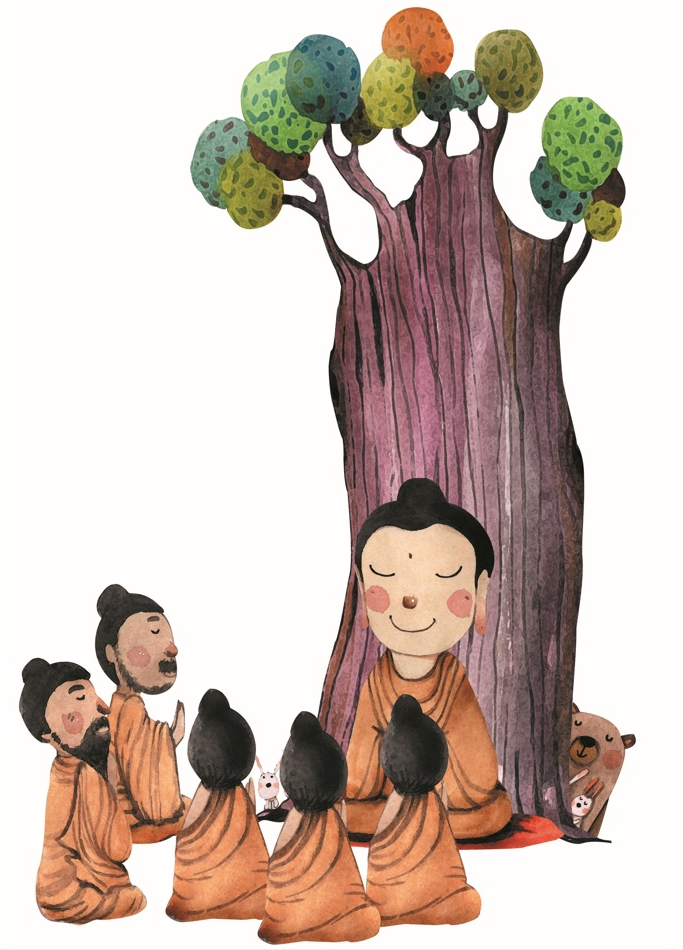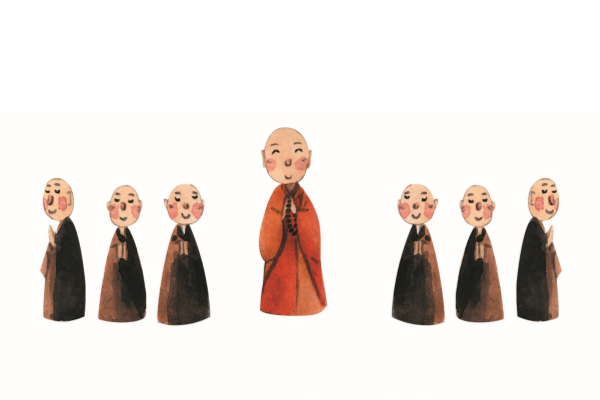Special Topics
The Three Refuges Verse for Morning and Evening Services as a Reminder
The Three RefugesAs I take refuge in the Buddha, I wish all sentient beings awaken to the great Path, and generate the supreme mind.
As I take refuge in the Dharma, I wish all sentient beings delve into the sutras, and have ocean-like wisdom.
As I take refuge in the Sangha, I wish all sentient beings live in great harmony, without any obstructions.

Towards the end of daily morning and evening services, Buddhists recite the Three Refuges and conclude the ritual with the transfer of merit. Excerpted from the "Chapter on Gocara-pariśuddhi" of the Buddhāvataṃsaka Sūtra, the Three Refuges serves as a reminder for Buddhists to aspire to take the Three Jewels as the ultimate refuge. Reciting the Three Refuges during the morning service reminds us to put our aspiration into practice. On the other hand, reciting Three Refuges during the evening service helps us to reflect on how much we have aligned ourselves with it.
As Elderly Ven. Meng Tsan (夢參老和尚) noted in his Dharma talk "Practicing the Three Refuges, (〈學三皈依〉)" "As I take refuge in the Buddha" indicates how we should emulate the Buddha in initiating the aspiration to attain Buddhahood, as well as his method to attain it. We should follow suit by walking his path. This represents "awakening to the great Path, and generating the supreme mind."
How do we navigate ourselves among numerous Buddhist scriptures and approaches to the Dharma? As Ven. Chin Kung (淨空法師) mentioned in his Dharma talk entitled "The Pure Land Approach: The Three Refuges as the Highest Guideline for Buddhist Teaching and Practice, (〈淨土法門:三皈依是佛法教學最高指導原則〉)" aspiring to learn and practice the Dharma taught by the Buddha all comes down to transforming our deeds, speech, and thoughts by "delving into the sutras," which contain the Threefold Training (triśikṣā) in moral conduct (śīla), concentration (samadhi), and wisdom (prajna). As we eradicate our Three Poisons—greed, aversion, and delusion—we can attain "ocean-like wisdom."
 As to "with myself taking refuge in the Sangha," here "sangha" refers to monastic communities, which uphold the Six Principles of Reverent Harmony and embrace selflessness and inclusiveness. "Living in great harmony" not only implies getting along with others, but also with ourselves. One's body and mind are often not in harmony. Thus, we wish that all sentient beings, including ourselves, can attain harmony of body and mind, harmony in family, and, furthermore, interpersonal harmony. When extended throughout society and the world, this will cause one to realize the spirit of being "without any obstructions."
As to "with myself taking refuge in the Sangha," here "sangha" refers to monastic communities, which uphold the Six Principles of Reverent Harmony and embrace selflessness and inclusiveness. "Living in great harmony" not only implies getting along with others, but also with ourselves. One's body and mind are often not in harmony. Thus, we wish that all sentient beings, including ourselves, can attain harmony of body and mind, harmony in family, and, furthermore, interpersonal harmony. When extended throughout society and the world, this will cause one to realize the spirit of being "without any obstructions."The 7th Changkya Khutukhtu once said, "Buddhist teachings value essence above form." After understanding the significance of the Three Refuges, we must keep in mind the essence of the Buddhadharma and the Three Refuges. This is the highest guiding principle for our spiritual practice.
Related articles:
Taking Refuge – The First Step to Firm Buddhist Practice
Overcoming the Eight Major Obstacles to Taking Refuge
Buddhist Stories on the Auspiciousness of Taking the Three Refuges
Taking Refuge: A Sincere Vow to Engage in Buddhist Practice
Common Questions on Taking Refuge
Refuge Taking Rituals of Different Buddhist Traditions
The Three Refuges Verse for Morning and Evening Services as a Reminder
Resource: Issue 373 of Humanity Magazine, Dharma Drum Publishing Corporation
Translation: Sinag-ling Li (李祥苓)
Editing: Keith Brown, Chia-Cheng Chang (張家誠)
